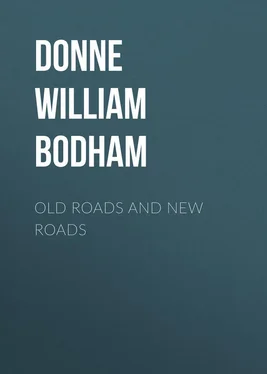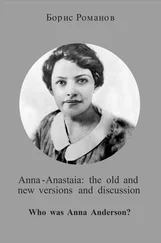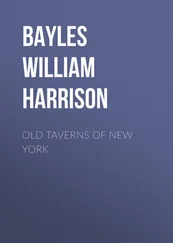William Donne - Old Roads and New Roads
Здесь есть возможность читать онлайн «William Donne - Old Roads and New Roads» — ознакомительный отрывок электронной книги совершенно бесплатно, а после прочтения отрывка купить полную версию. В некоторых случаях можно слушать аудио, скачать через торрент в формате fb2 и присутствует краткое содержание. Жанр: foreign_antique, foreign_prose, на английском языке. Описание произведения, (предисловие) а так же отзывы посетителей доступны на портале библиотеки ЛибКат.
- Название:Old Roads and New Roads
- Автор:
- Жанр:
- Год:неизвестен
- ISBN:нет данных
- Рейтинг книги:3 / 5. Голосов: 1
-
Избранное:Добавить в избранное
- Отзывы:
-
Ваша оценка:
- 60
- 1
- 2
- 3
- 4
- 5
Old Roads and New Roads: краткое содержание, описание и аннотация
Предлагаем к чтению аннотацию, описание, краткое содержание или предисловие (зависит от того, что написал сам автор книги «Old Roads and New Roads»). Если вы не нашли необходимую информацию о книге — напишите в комментариях, мы постараемся отыскать её.
Old Roads and New Roads — читать онлайн ознакомительный отрывок
Ниже представлен текст книги, разбитый по страницам. Система сохранения места последней прочитанной страницы, позволяет с удобством читать онлайн бесплатно книгу «Old Roads and New Roads», без необходимости каждый раз заново искать на чём Вы остановились. Поставьте закладку, и сможете в любой момент перейти на страницу, на которой закончили чтение.
Интервал:
Закладка:
Gibbon describes bishops as among the most rapid of ancient travellers. The decease of a patriarch of Alexandria or Antioch caused the death of scores of post-horses, from the rate at which anxious divines hurried to Constantinople to solicit from the Emperor the vacant see. On the whole however, in respect of speed in travelling, the Greeks and Romans were but slow coaches; and these exceptional instances merely serve to prove the general slackness of their pace. A Roman nobleman indeed, with all the means and appliances which his wealth could purchase, and with the positive advantage of the best roads in the world, travelled generally with such a ponderous train, that the heavy-armed legions with their parks of artillery might well advance as rapidly as an Olybrius or Anicius of the Empire. “In their journeys into the country,” says Ammianus, “the whole body of the household marches with their master. In the same manner as the cavalry and infantry, the heavy and the light armed troops, the advanced guard and the rear, are marshalled by the skill of their military leaders; so the domestic officers who bear the rod, as an ensign of authority, distribute and arrange the numerous train of slaves and attendants. The baggage and wardrobe move in the front; and are immediately followed by a multitude of cooks and inferior ministers, employed in the service of the kitchen and of the table. The main body is composed of a promiscuous crowd of slaves, increased by the accidental concourse of idle or dependent plebeians.”
At an even earlier period, in the age of Nero, before luxury had made the gigantic strides which distinguished and disgraced the Byzantine Court, Seneca records three circumstances relative to the journeys of the Roman nobility. They were preceded by a troop of Numidian light horse who announced by a cloud of dust the approach of a great man. Their baggage-mules transported not only the precious vases, but even the fragile vessels of crystal and murra , which last probably meant the porcelain of China and Japan. The delicate faces of the young slaves were covered with a medicated crust or ointment, which secured them against the effects of the sun and frost. Rightly did the Romans name their baggage impedimenta . A funeral pace was the utmost that could be expected from travellers so particular about their accommodations as these luxurious senators. Of a much humbler character was the state observed by the monarchs who succeeded to portions of the empire of the Cæsars. The Merovingian kings, when they employed wheel carriages at all, rode in wains drawn by bullocks; the Bretwaldas of the Saxon kingdoms went to temple or church on high festivals in the same cumbrous fashion; and “slow oxen” dragged the standard of the Italian Republics into the battle-field.
With the disuse or breaking up of the great Roman Viæ in our island, the difficulty and delay of travelling increased, and more than thirteen centuries elapsed before it was again possible to journey with any tolerable speed. Wolsey indeed, it is well known, by the singular rapidity with which he conveyed royal letters to and from Brussels, galloped swiftly up the road of royal favour: and by his fast style of living at home afterwards galloped even more swiftly down again. Mordaunt, Earl of Peterborough, was noted for his incessant restlessness, and his rapid mode of passing from one land to another; but then he dispensed with all state and attendance, and rode like a post-boy from one end of Europe to another. As the readers of Pope, Swift, and their contemporaries are daily becoming fewer in number, we venture to extract the Dean’s pleasant burlesque on this eccentric nobleman’s migratory habits.
“Mordanto fills the trump of fame,
The Christian worlds his deeds proclaim,
And prints are crowded with his name.
In journeys he outrides the post,
Sits up till midnight with his host,
Talks politics and gives the toast;
Knows every prince in Europe’s face,
Flies like a squib from place to place,
And travels not, but runs a race.
From Paris gazette à-la-main,
This day arrived, without his train,
Mordanto in a week from Spain.
A messenger comes all a-reek,
Mordanto at Madrid to seek;
He left the town above a week.
Next day the post-boy winds his horn,
And rides through Dover in the morn;
Mordanto’s landed from Leghorn.
Mordanto gallops on alone;
The roads are with his followers strown;
This breaks a girth and that a bone.
His body active as his mind,
Конец ознакомительного фрагмента.
Текст предоставлен ООО «ЛитРес».
Прочитайте эту книгу целиком, купив полную легальную версию на ЛитРес.
Безопасно оплатить книгу можно банковской картой Visa, MasterCard, Maestro, со счета мобильного телефона, с платежного терминала, в салоне МТС или Связной, через PayPal, WebMoney, Яндекс.Деньги, QIWI Кошелек, бонусными картами или другим удобным Вам способом.
1
The appellation of this, the earliest Roman road, affords another instructive example of the connection between the necessary wants of man and civilization. Salt, among the first needs of the city of Romulus, produced the path from the Salt-works; and the convenience of the Salt-work Road led ultimately to the construction of the Appian, Flaminian, and Æmilian.
2
The first introduction of stirrups was probably not earlier than the end of the sixth century, a. d. See Beckmann’s ‘History of Inventions and Discoveries,’ Eng. Trans., 1817, vol. ii. pp. 255–270.
3
It is acknowledged on all hands that no people talk so much about weather as the English. It is also true that no literature contains so many descriptions of the sensations dependent on the seasons. A French or Italian poet generally goes to Arcadia to fetch images proper for “a fine day.” We, on the contrary, paint from the life. Chaucer luxuriates, in his opening lines of the ‘Canterbury Tales,’ on the blessings and virtues of “April shoures.” Our modern novelists are always very diffuse meteorologists. In lands where the seasons are unhappily uniform, the natives are debarred from this unfailing topic of conversation. Hajji Baba, in Mr. Morier’s pleasant tale, is amazed at being told at Ispahan, by the surgeon of the English Embassy, that “it was a fine day.” On the banks of the South American rivers, mosquitoes afford a useful substitute for meteorological remarks. – “How did you sleep last night?” “Sleep! not a wink. I was hitting at the mosquitoes all night, and am, you see, bitten like a roach notwithstanding.”
4
The historian might have added to this description of Roman carriages an allusion to the sumptuousness of Roman harness. Apuleius informs us that “necklaces of gold and silver thread embroidered with pearls encircled the necks of the horses; that the head-bands glittered with gems; and the saddles, traces, and reins were cased in bright ribbons.”
5
Not always, on horseback: for while the knight, as his Latin designation eques implied, was always mounted on a charger, his lady sometimes rode beside him on an ass: —
Читать дальшеИнтервал:
Закладка:
Похожие книги на «Old Roads and New Roads»
Представляем Вашему вниманию похожие книги на «Old Roads and New Roads» списком для выбора. Мы отобрали схожую по названию и смыслу литературу в надежде предоставить читателям больше вариантов отыскать новые, интересные, ещё непрочитанные произведения.
Обсуждение, отзывы о книге «Old Roads and New Roads» и просто собственные мнения читателей. Оставьте ваши комментарии, напишите, что Вы думаете о произведении, его смысле или главных героях. Укажите что конкретно понравилось, а что нет, и почему Вы так считаете.












